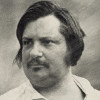“ When man has inquired of himself whether he has seen that which he has seen, whether he has heard the words that entered his ears, whether the facts were facts and the idea is indeed an idea, then he resumes his wonted bearing, thinks of his worldly interests, obeys some envoy of death and of oblivion whose dusky mantle covers like a pall an ancient Humanity of which the moderns retain no memory. ”
Honoré de Balzac, Séraphîta (1834). copy citation
| Author | Honoré de Balzac |
|---|---|
| Source | Séraphîta |
| Topic | humanity death |
| Date | 1834 |
| Language | English |
| Reference | |
| Note | Translated by Katharine Prescott Wormeley |
| Weblink | http://www.gutenberg.org/files/1432/1432-h/1432-h.htm |
Context
“Why this,—that the peoples live as they have ever lived, as they lived in the first Olympiad, as they lived on the morrow of Creation, and on the eve of the great cataclysm. The waves of Doubt have covered all things. The same floods surge with the same measured motion on the human granite which serves as a boundary to the ocean of intelligence. When man has inquired of himself whether he has seen that which he has seen, whether he has heard the words that entered his ears, whether the facts were facts and the idea is indeed an idea, then he resumes his wonted bearing, thinks of his worldly interests, obeys some envoy of death and of oblivion whose dusky mantle covers like a pall an ancient Humanity of which the moderns retain no memory. Man never pauses; he goes his round, he vegetates until the appointed day when his Axe falls. If this wave force, this pressure of bitter waters prevents all progress, no doubt it also warns of death.”
source



